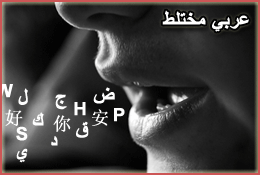-
 ja3r saysFri 23rd Oct 09@02:07 pmCool lesson! Is "marrah" the same as the مرّة meaning "once" or "time" in MSA? Thanks :)
ja3r saysFri 23rd Oct 09@02:07 pmCool lesson! Is "marrah" the same as the مرّة meaning "once" or "time" in MSA? Thanks :) -
Oops, I meant is it spelled the same but with a different meaning?
-
The macaronic language presented in this lesson would probably be described in puristic circles as "munharif" (deviant), but it reflects a universal tendency to mix languages. Macaronic poetry was popular in medieval Europe, and German students used to sing songs which were a mixture of German and medieval Latin.
The tendency to mix languages has always fuelled language change. As a result, most languages are full of calques (also known as "loan translations"). Thus, for instance, "waziir al-awwal" - a calque of Fr. "premier ministre" - is used in former French North Africa instead of "ra'iis al-wuzaraa'"; the French noun "gratte-ciel" and its Spanish equivalent "rascacielos" are both calques of Engl. "skyscraper" (cf. Arab. "naatiha sahaab"); and the English expression "blue blood" is a calque of the Spanish expression "sangre azul".
In Germany the children of Arabic-speaking immigrants use Arabic words like "sharmuta" when conversing in German, and many Arabic and Turkish words have been introduced by immigrant shopkeepers. A couple of weeks ago, for instance, I discovered the Arabic word "schwarma" on a huge illuminated advert panel outside a restaurant near a German railway station.
It remains to add that diglossia and bilingualism have been discussed in great detail in a recent book by Kees Versteeh, The Arabic Language (Edinburgh University Press). Versteeh examines the use of Arabic in Europe as well as in North Africa and the Middle East. -
Thanks for sharing the excellent information Desmond!
Ja3r, yes Marrah also means once. Basically if the word following مرة is an adjective then the meaning changes to ‘very’. It’s used like this in colloquial Arabic e.g
مرّة حلو – Very nice/sweet
أحبها مرة كثير – I love her very much
-
It's interesting to note that "marra", unlike other Arabic adverbs, is placed before the adjective it modifies. Admittedly, "jiddan" can also be anteposed, but it is normally placed after the adjective to which it refers and can even be repeated several times in spoken Arabic. (I recently observed this phenomenon in a highly emotional interview given by a young Palestinian in one of the BBC's Arabic programmes.)
"Marra" is no doubt one of the most useful words in the Arabic language. There are popular songs entitled "awwal marra" and "thani marra". In Egyptian Arabic "kadha marra" means "many times". In MSA "kull marra" ("every time") and "marra ukhra" ("another time" or "one more time") are high-frequency word combinations. "Marra" also appears in the compound noun "ism al-marra" - a linguistic term which English-speaking Arabists render as "noun of instance". "Mawja" (= wave, billow), for instance, is classified as a noun of instance (ism al-marra), while "mawj" (= waves) is labelled a generic noun (ism al-jins). -
Some adaptations of English words are very ingenious. "Google", for instance has been transformed into ﺠﻮﺠﻞ because there is no Arabic letter that corresponds exactly to "g".
Lower Intermediate - Mixed Arabic
| October 23rd, 2009 | 6 comments |
Today we have a lesson like no other! What might be a controversial lesson is, in our opinion, a good way to teach you the cultural realities of today. It happens with everyone who speaks more than one language; they occasionally mix the languages together! On the other hand, some people intentionally mix the languages, as they find it cool. You end up having a couple of Arabic and English words in the same sentence. Confusing I know but marrah cool!

|
 MP3 Download MP3 Download
 PDF Transcript PDF Transcript
|
 Audio Transcript Audio Transcript
 Exercise Exercise
|
|
| Basic | Premium | |
|---|---|---|
Join the Discussion

Random Word
اشتر |
|

Advertisement

